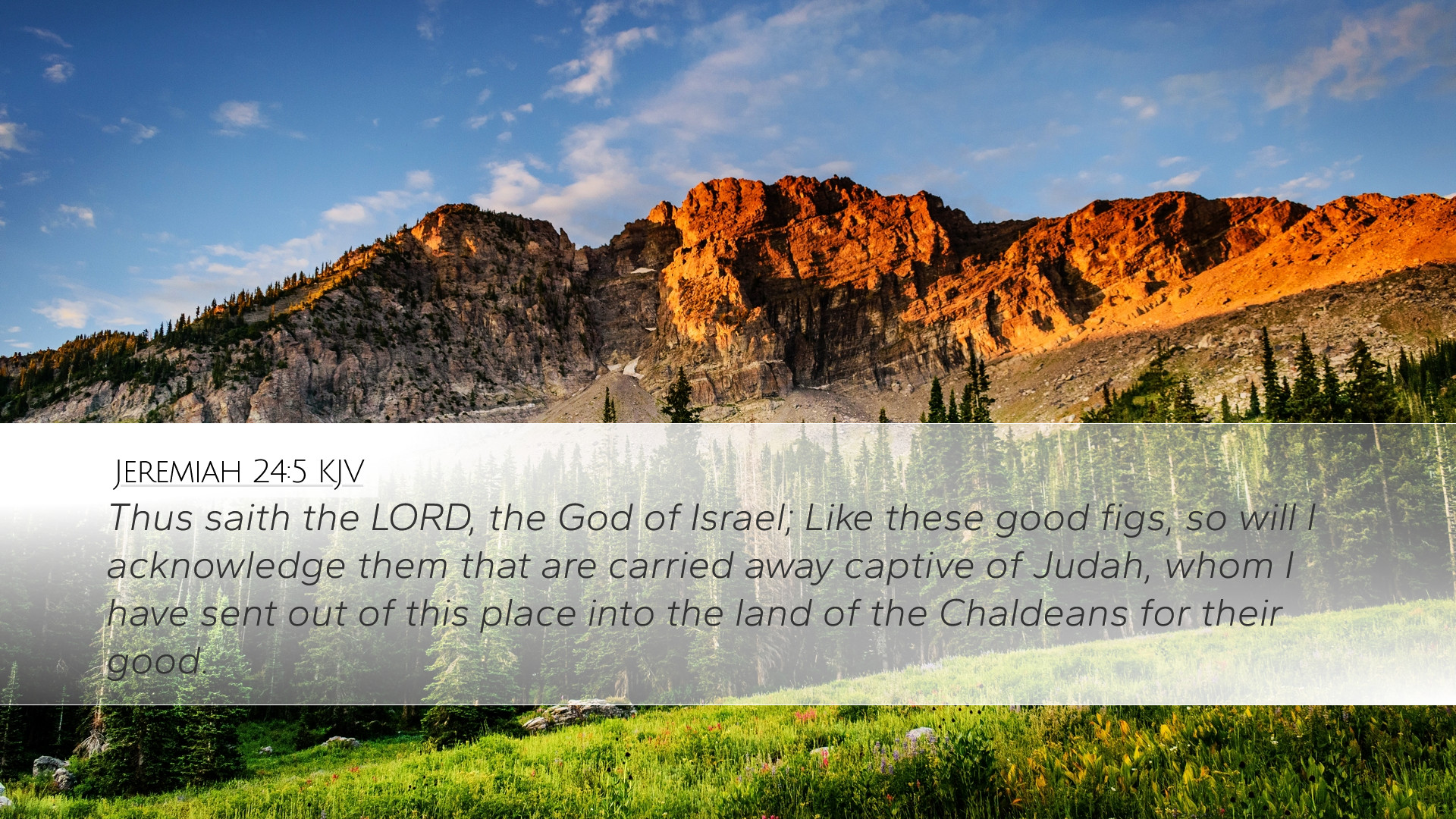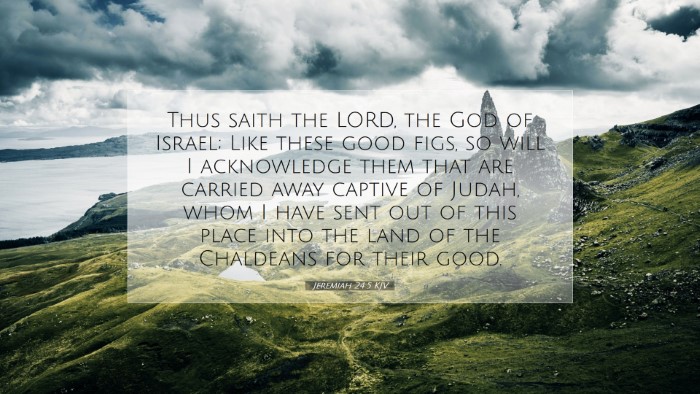Commentary on Jeremiah 24:5
Verse Under Consideration: "Thus saith the Lord, The Lord of hosts, the God of Israel; Like these good figs, so will I acknowledge them that are carried away captive of Judah, whom I have sent out of this place into the land of the Chaldeans." (Jeremiah 24:5)
Introduction
Jeremiah 24 is a pivotal chapter within the Book of Jeremiah, offering a prophetic metaphor regarding two baskets of figs placed before the temple of the Lord. This imagery encapsulates God’s assessment of the exiles from Judah, distinguishing between those who will prosper and those who will face judgment. The insights from various public domain commentaries shed significant light on the theological implications and practical applications for spiritual growth.
Theological Implications
The declaration in Jeremiah 24:5 serves as a profound reminder of God's faithfulness and sovereignty. The good figs (representing the exiles) signify hope for restoration and a future resurgence of Israel. Understanding this verse within the larger narrative of Jeremiah enhances its depth and underscores the following themes:
- Punishment and Preservation: God acknowledges the exiles not merely as recipients of punishment but as a remnant that He intends to preserve and ultimately bless.
- The Nature of True Exile: The distinction between the 'good figs' and the 'evil figs' (mentioned later in the chapter) points to God's overarching plan. The exiles are not forsaken; rather, they are part of a divine schema.\
- Restoration and Hope: The promise of acknowledgment signals that God has not forgotten His covenant people, but is actively working through their circumstances to bring about restoration.
Insights from Commentators
Matthew Henry
Matthew Henry emphasizes that the acknowledgment of the captives as “good figs” reflects God’s unyielding desire for His people’s restoration. He notes that in times of calamity, God's eye is still on His people, and He orchestrates a path for their return. Henry encourages readers to recognize their circumstances as part of God’s providential care, highlighting the necessity of faith amidst adversity.
Albert Barnes
Albert Barnes elaborates on the implications of being considered “good figs.” He points out that this designation implies a divine purpose within the captivity of Judah. Barnes suggests that the captives will be recognized for their potential to serve God faithfully in a foreign land. He reflects on the significance of God's promise to nurture and help them even in exile, reminding us to maintain hope in God’s redemptive plans regardless of current realities.
Adam Clarke
Adam Clarke's commentary adds depth by discussing the historical context of the Exile. He suggests that ‘good figs’ represents those who were obedient to God's will and trusted in His overarching plan, whereas the ‘evil figs’ represent those who remained in Jerusalem and fell into despair. Clarke asserts that God calls His people to endure patiently, assuring them of His protective hand during tumultuous times, thereby reinforcing the themes of dependence and hope in God’s faithfulness.
Application for Today's Believers
For pastors, students, theologians, and Bible scholars, the insights from Jeremiah 24:5 offer valuable principles for application:
- Embrace God's Sovereignty: Recognizing God’s control over historical and personal circumstances encourages believers to trust Him even when faced with difficulties.
- Live as a Faithful Remnant: Just as the exiles were called ‘good figs,’ believers are challenged to maintain righteousness and faithfulness, representing Christ in a world that often opposes divine truths.
- Hope in Restoration: The promise of acknowledgment from God assures believers that He sees their struggles and is committed to bringing about restoration and growth, encouraging perseverance in faith.
Conclusion
In summarizing the insights gleaned from Jeremiah 24:5, we find a multifaceted narrative that underscores the dynamic relationship between God and His people. The exiled community is not abandoned. Rather, they become a focal point for God's redemptive work. As we engage with Scripture, may we be inspired to view our trials through the lens of hope, rooted in the understanding that God, like the careful gardener, tends to His good figs, preparing them for a fruitful future.


